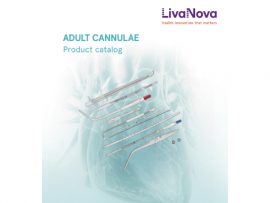Abstract Amniotic fluid embolism (AFE) is a critical obstetric complication characterized by the entry of amniotic fluid and its components into maternal circulation during parturition, leading to acute cardiopulmonary failure,..
Read MoreAbstract Extracorporeal membrane oxygenation (ECMO) has become a critical rescue therapy for pregnant and peripartum patients experiencing life-threatening cardiac or respiratory failure that is refractory to standard treatments. Pregnancy induces..
Read MoreAbstract This review examines the role of extracorporeal membrane oxygenation (ECMO) in the management of severe acute respiratory distress syndrome (ARDS), emphasizing its contribution to lung-protective ventilation through optimizing oxygenation..
Read MoreAbstract Background: Compared to heparin, there is limited evidence of the benefits of bivalirudin in the patients with extracorporeal membrane oxygenation (ECMO). Methods: We searched for studies comparing bivalirudin anticoagulation..
Read MoreAbstract Von Willebrand factor (vWF) orchestrates hemostasis through platelet activation, factor VIII stabilization, and inflammatory modulation, with emerging evidence highlighting its shear-dependent conformational dynamics as a critical regulator of thrombus..
Read MoreAbstract Background Extracorporeal membrane oxygenation (ECMO) is a life-saving treatment, but carries a high risk of complications such as acute kidney injury (AKI). A contributor to AKI is hemolysis, which..
Read MoreAbstract Background The optimal transfusion threshold for patients undergoing venoarterial extracorporeal membrane oxygenation (VA-ECMO) remains uncertain. Methods We used data from OBLEX (ClinicalTrials.gov: NCT03714048), an international, prospective, observational study conducted..
Read MoreAbstract Background Amniotic fluid embolism is a rare potential complication in the peripartum period. Case Summary A 27-year-old nulliparous woman presented for elective induction at 41 weeks' gestation. Due to..
Read MoreAbstract Purpose To assess whether prone positioning (PP) increases bleeding risk compared to supine positioning in ARDS patients undergoing veno venous Extracorporeal Membrane Oxygenation (VV ECMO). Materials and Methods A..
Read MoreAbstract Venovenous extracorporeal membrane oxygenation (VV ECMO) relies on effective blood drainage, and cannula design plays a crucial role in optimizing blood oxygenation. Recirculation, where oxygenated blood returns to the..
Read MoreAbstract Extracorporeal membrane oxygenation (ECMO) is a fundamental treatment for cardiovascular and severe pulmonary diseases, with small animal models providing critical insights into organ protection during cardiopulmonary bypass and ECMO..
Read MoreAbstract Extracorporeal membrane oxygenation (ECMO) is a mechanical circulatory and respiratory support system that facilitates gas exchange and hemodynamic stabilization through an external circuit. ECMO has been increasingly utilized for..
Read MoreAbstract Objectives: We examined data from the International Registry of the Extracorporeal Life Support Organization to identify risk factors for mortality in pregnant and peripartum patients receiving extracorporeal membrane oxygenation...
Read MoreAbstract Venoarterial extracorporeal membrane oxygenation (VA-ECMO) serves as a critical mechanical circulatory support modality, sustaining systemic circulation in cases of severe cardiac failure or cardiac arrest. While VA-ECMO improves hemodynamics,..
Read MoreAbstract Nutritional support in pediatric patients receiving extracorporeal membrane oxygenation (ECMO) therapy is controversial. Although ECMO is increasingly used in pediatric intensive care units, there is no consensus on the..
Read MoreAbstract Veno-arterial extracorporeal membrane oxygenation (ECMO) brings many monitoring pitfalls due to the countercurrent blood flow, which may create left ventricular overload and perfusion imbalances between the two cerebral hemispheres...
Read MoreAbstract Background Prior clinical research demonstrated that rapid reduction in arterial carbon dioxide (PaCO2) levels during extracorporeal membrane oxygenation (ECMO) is associated with acute brain injury (ABI), which may be..
Read MoreAbstract Purpose The optimal ventilation strategy in acute respiratory distress syndrome (ARDS) patients with veno-venous extracorporeal membrane oxygenation (VV-ECMO) remains unknown. We aimed to compare the effects of two ultra-protective..
Read MoreAbstract Background The use of extracorporeal life support (ECLS) has expanded to include unique populations such as peripartum women. This systematic review aims to (1) quantify the number of cases..
Read MoreAt the time of publication of this guideline, the leading causes of maternal death for pregnant and peripartum patients include hemorrhage, infection, eclampsia, thromboembolism, and cardiac disease. Not only are these..
Read MoreAbstract Background Veno-venous extracorporeal membrane oxygenation (VV-ECMO) supports critically ill patients with respiratory failure. However, ECMO may induce systemic inflammation, hemolysis, and hemodilution, potentially resulting in endothelial activation and damage. Therefore,..
Read MoreAbstract Introduction Blood Stream Infections (BSI) occur in 3-35% of patients on ECMO (Extracorporeal membrane Oxygenation). With the increased use of ECMO since the COVID-19 pandemic, the magnitude of this..
Read MoreAbstract Venoarterial extracorporeal membrane oxygenation (VA-ECMO) often leads to left ventricular (LV) overload, particularly in patients with biventricular cardiogenic shock. This increased afterload can hinder cardiac muscle recovery and cause..
Read MoreAbstract Background: Extracorporeal membrane oxygenation (ECMO) requires systemic anticoagulation to prevent clotting, typically using unfractionated heparin (UFH). However, anticoagulation carries a bleeding risk, necessitating monitoring. Activated clotting time (ACT) is..
Read MoreAbstract Extracorporeal membrane oxygenation (ECMO) is a form of cardiopulmonary support associated with improved survival in severe respiratory failure and refractory cardiac arrest. Extracorporeal membrane oxygenation is highly specialized and..
Read MoreAbstract BACKGROUND: Extracorporeal membrane oxygenation (ECMO) is an effective measure for saving the lives of critically ill patients. Prompt identification of the risk factors for mortality among patients receiving ECMO and..
Read MoreAbstract Objectives The platelet trigger at which to transfuse platelets to prevent bleeding complications in patients supported with extracorporeal membrane oxygenation (ECMO) is unclear. We aimed to elucidate the association..
Read MoreAbstract Background (ECMO) may be used to support critically ill patients before . The relationship between preoperative venoarterial and venovenous ECMO and their relationship with indications remain poorly elucidated. Methods This study..
Read MoreAbstract Objectives: To evaluate the safety and efficacy of venovenous extracorporeal membrane oxygenation (ECMO) cannulation by nonsurgeon intensivists (critical care medicine intensivists [CCM]) compared with cardiothoracic surgeons (CTS). Design: Retrospective,..
Read MoreAbstract There are limited data on the use of extracorporeal membrane oxygenation (ECMO) in high-risk pulmonary embolism (PE) patients. We analyzed the use of ECMO in high-risk PE patients (defined..
Read More

















